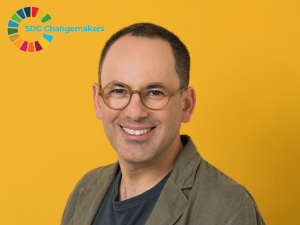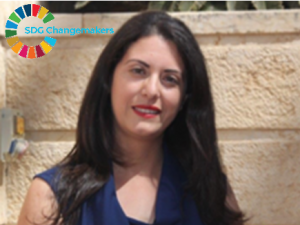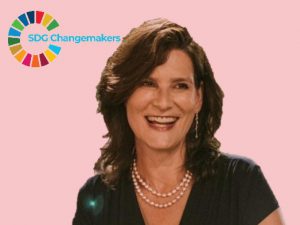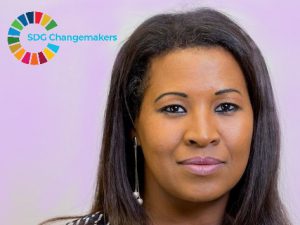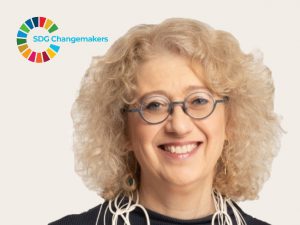CEO
“Maala” for Corporate Social Responsibility
SII: Please briefly describe your work
MM: Our mission at Maala is to motivate and guide businesses to create positive impact on society and the environment. Our main channels are the annual Maala ESG* index on the Tel Aviv Stock Exchange and a network of about 130 of Israel’s largest businesses. We strive to create momentum for excellence and positive business impact. Prior to joining Maala, I was part of the Israeli environmental movement and a community organizer. I feel this has given me a perspective on the importance of bridging between societal and environmental needs and businesses. I have been with Maala since 2006, and over the years have seen considerable change in the way Israeli businesses understand their impact on society and the environment.
SII: Please characterize your interaction with government, civil society and the private sector
MM: Maala serves as a hub for sustainable business practices and solutions that in many cases come from cross-sector cooperation with the government and civil society. A recent new collaboration that I’m very excited about is the DEI** index, launched in a joint effort by Maala and the Commission for Equal Employment Opportunities, which is part of the Israeli Ministry of Economy and Industry. The DEI Index represents a new advanced standard for measuring and managing diversity, gender equality and a multi-cultural work environment. This is a strong example of combining regulation, market education, DEI leadership and corporate social responsibility in order to deal with a complex challenge.
We have additional formal and informal cooperation and joint ventures with numerous government entities and civil society organizations on climate change, sustainable transportation, safety and more.
SII: Name three principle values that you associate with your work?
MM: 1. The business sector is part of the solution if we want to find ways to meet the challenges that face the Israeli society today.
2. Voluntary action and self-motivation are very powerful in driving positive change.
3. Societal change takes time and patience, guided by a clear vision for the work.
SII: What particularly motivates you to make a difference?
MM: I’m optimistic at heart and believe that most people strive to have a positive impact. It is unsettling to see how divided society is becoming, how the level of trust in institutions is dropping. In view of that I feel there is a stronger need to show that there is room for moderation, dialogue and persistence to deal with the complex problems the world is facing, particularly inequality and climate change.
SII: What positive impact do you see emerging through your activity?
MM: The Maala ESG Index helps me see the change that we are part of. Over the years we have seen how companies use the Maala ESG Index questionnaire as a sort of guidebook and adopt voluntary standards, such as: changing their recruitment process to create more diversity and gender equality; increasing their community investment; and engaging in dialogue with stakeholders to reduce their environmental footprint. A very recent example is the DEI Index – companies are already using it as a basis for building a long-term DEI program, and several have reported they are setting new programs and goals to complement the Index requirements.
More broadly, Maala’s mission is all about encouraging and pushing companies to have a more positive impact on society and environment by leveraging their business actions. Many of the major challenges are still there, but we see more and more initiatives that add up and follow that vision. Some of those discussed at our recent conference and on Maala’s VOD channel include: a food company that committed to reducing food waste by increasing food donations; a pharmaceuticals company that is committed to supplying medication to developing countries, thus increasing access to healthcare and medicine; and a bank that has issued bonds in order to finance a green transition.
SII: What is your favorite project?
MM: The Maala VOD channel, which we launched during the pandemic. We set up our own studio in-house, created a library with over 150 videos (and counting) with the people leading ESG and sustainability in Israel and globally. I enjoy the conversations and engagement, and believe that we are creating a hub for unique content that continues to gain interest.
SII: How has your work been affected by the COVID-19 crisis?
It’s been a bumpy journey but all-in-all we have grown with an unprecedented number of companies joining our network and an even stronger understanding of the essence of our work. Actually, Covid has created new opportunities and methods of work to deliver impact – as illustrated by the Maala VOD channel. Most importantly, it seems that Covid has affected businesses and increased social awareness, which we see among our corporate members over the past two years.
More about Momo Mahadav:
Momo was appointed CEO of Maala in 2009; he joined in 2006, bringing with him extensive experience working in public policy frameworks as well as environmental and community work. Previously, he was Director of the Society for the Protection of Nature in Israel’s Tel Aviv Center for Environmental Action. In the past he also coordinated city-wide projects at the Tel Aviv Municipality and worked as a community organizer. In addition to heading Maala, Momo also serves as a board member in a number of non-profit organizations in Israel and teaches at Ben-Gurion University in the Negev. He holds a master’s degree in Public Policy and a bachelor’s degree in Social Work, both from Tel Aviv University.
*Environmental, Social and Corporate Governance
**Diversity, Equity and Inclusion


